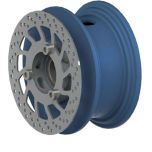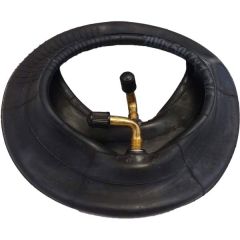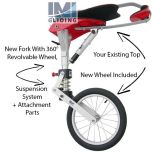TOST 6" Disk Brake Wheel
TOST 5" Disk Brake Wheel


General Description
TOST 6″ Disk Brake Wheel Classic – With our very highly stressable 6" disk brake wheels from aluminum die–cast and the big brake assemblies 30–63A and BZT2, we can offer an ideal combination for high landing speed and take–off weight.
TOST 6″ Disk Brake Wheel Penta – Particularly for double–seated gliders of the 20m class or of the Open Class, our light 6″ Penta disk brake wheel is highly suited. It offers the same advantages as the 5″ Penta disk brake wheel: an extra–light wheel hub with an asymmetric split for easy tire mounting.
TOST 6″ Disk Brake Wheel Ultralight – For Ultralights every gram counts. That is why we designed a light disk brake wheel with a compact 6–piston brake assembly. The tire seat is adapted to the well–tried Ultralight tire size 4.00–6.
TOST 6″ Disk Brake Wheel Seawater Resistant – For use in amphibians or saltwater exposed equipment we manufacture the 6″ disk brake wheel Classic also as seawater resistant version. With a special surface treatment, bearings from stainless steel with special seals are coated with bolts, these wheel hubs are highly corrosion–resistant.
TOST 6" Disk Brake Wheel price varies depending on selection.
Use above dropdown box for selections and final price.


TOST 6" Disk Brake Classic
|
P/N SKU |
Desc |
Install Width mm |
Total Width mm |
Bearing ∅ mm |
|
056135 6113 |
6" Disk Brake Wheel Classic |
|||
|
056631 6115 |
6" Disk Brake Wheel Classic Bearing Reinforced |
|||
|
056650 6116 |
6′′ SB Classic 140-95-40 |
95 | 140 | 40 |
|
056670 5209 |
6" Disk Brake Wheel Classic |
|||
|
056653 6117 |
6" Disk Brake Wheel Classic |
|||
|
056652 6120 |
6′′ SB Classic 140-80-50 |
80 | 140 | 50 |
|
056607 6123 |
6′′ SB Classic |
85 | 148.5 | 1½ |
|
056608 5208 |
6′′ SB Classic |
85 | 151 | ¼ |
|
056655 5207 |
6" Disk Brake Wheel Classic |
|||
|
056161 6124 |
6′′ SB Super |
113 | 151 | 30 |
| Tire Size |
Weight g W/O Tire |
Brake Torque Nm Max |
Brake Disk |
Suitable Brake Asy |
| 056135 | ||||
| 056631 | ||||
|
056650 6.00-6 |
3200 | 450 | 057095 |
30-63A BZT2 |
| 056670 | ||||
| 056653 | ||||
|
056652 6.00-6 |
3150 | 370 | 057515 |
30-90 BZT2 |
|
056607 6.00-6 |
3500 | 450 | 057099 |
30-63A BZT2 |
|
056608 6.00-6 |
3500 | 450 | 057099 |
30-63A BZT2 |
| 056655 | ||||
|
056161 6.00-6 |
3500 | 420 | 057091 |
30-63A BZT2 |
TOST 6" Disk Brake Wheel Penta
|
P/N SKU |
Desc |
Install Width mm |
Total Width mm |
Bearing ∅ mm |
|
056950 6127 |
6′′ SBP Penta 128-100-30 |
128 | 100 | 30 |
|
056960 6128 |
6′′ SBP Penta 138-110-30 |
110 | 138 | 30 |
|
056980 6129 |
6′′ SBP Penta 114-65-30 |
65 | 114 | 30 |
| Tire Size |
Mass g W/O Tire |
Brake Torque Nm Max |
Brake Disk |
Suitable Brake Asy |
|
056950 6.00-6 15×6.00-6 7.00-6 |
2600 | 370 | 057260 |
30-9 BZT2 |
|
056960 6.00-6 15×6.00-6 7.00-6 |
2711 | 370 | 057260 |
30-9 BZT2 |
|
056980 6.00-6 15×6.00-6 7.00-6 |
2070 | 370 | 057260 |
30-9 BZT2 |
TOST 6" Disk Brake Wheel Penta Tubeless
|
P/N SKU |
Desc |
Install Width mm |
Total Width mm |
Bearing ∅ mm |
|
056990 6130 |
6“ SBL 145-85-40 tubeless |
85 | 145 | 40 |
|
Tire Size
|
Weight g W/O Tire |
Brake Torque Nm Max |
Brake Disk |
Sutiable Brake Asy |
|
056990 15×6.00-6 TL |
2980 | 1000 | 057098 | BZT4 |
TOST 6" Disk Brake Ultralight
|
P/N SKU |
Desc |
Install Width mm |
Total Width mm |
Bearing ∅ mm |
|
056820 6132 |
6′′ SBP UL 105-50-20 | 50 | 105 | 20 |
| Tire Size |
Mass g W/O Tire |
Brake Disk |
Suitable Brake Asy |
|
| 4.00-6 | 1350 | 057316 | BZ-UL |
TOST 6" Disk Brake Classic Seawater Resistant
|
P/N SKU |
Desc |
Install Width mm |
Total Width mm |
Bearing ∅ mm |
|
056640 6125 |
6′′ SB Classic 140-95-40 seawater resistant |
95 | 140 | 40 |
| Tire Size |
Weight g W/O Tire |
Brake Torque Nm Max |
Brake Disk |
Suitable Brake Asy |
| 6.00-6 15×6.00-6 7.00-6 |
3200 | 450 | 057096 |
30-63A BZT2 |
For many years disk brake wheels (SB) have been the first choice as a braked wheel for gliders, motor gliders, Ultralight aircraft, powered aircraft as well as for helicopters and gyrocopters. Due to the facts that the brake force can be well-applied, the automatic re-adjustment of the lining abrasion and the high, stable braking power, disk brake wheels provide an ideal braking efficiency in all situations and ensure the safe realization of a flight.
Remark to the tables:
The indication of the mass of a wheel includes the wheel hub with ball bearings and brake disk. You can find the mass of the tires/tubes and brake assemblies in the correspondent chapters of the catalog.
Pay attention to the following points to ensure the operational function of the brake system in your aircraft:
- The min. thickness of the brake disk may not be underrun, see page 29 of the TOST Catalog
- The minimum thickness of the brake lining may not be underrun, see page 50 of the TOST Catalog
- Watch out for sealings and boltings so that no leakage may occur
- Change the brake fluid regularly
- Never mix brake fluid DOT 4 and Mineral Fluid
- The brake system should be well-bled
Maintenance notes for brake disk
- Inspect brake disk for cracks, excessive wear and tear, grooves, corrosion and deformation.
- Remove corrosion and smooth smaller nicks with fine emery paper (400 grain).
- Replace the brake disk, if it is worn beyond the wear limit (see below).
Measure this minimum at two or three spots. - Replace the brake disk if it has an axial throw of 0.2 mm.
- Brake disks are surface-treated only for special applications. A rust film of varying degree may form on the brake disk. That can be removed with one or two parking brake operations.
- If rust has progressed further, it may be necessary to dismantle the disk from thewheel so that both disk surfaces can be cleaned properly. First use a steel brush, then follow with 220 grain emery paper. Finally polish with 400 grain emery paper. This procedure may allow you to continue using the brake disk.
| Disk Thickness mm | Wear Limit mm |
| 1.5 | 1.3 |
| 2.0 | 1.7 |
| 4.0 | 3.3 |
| 5.0 | 4.3 |
| 6.0 | 5.2 |
| 6.5 | 5.5 |
| 8.0 | 7.0 |
Notes to aircraft tires
Tire exchange
Removal:
- Jack up aircraft at specified point.
- Deflate tire completely before removing wheel unit.
- Do not unscrew the valve insert until the tire pressure has dropped to 0.2 bar.
- Remove wheel from axle.
- Loosen wheel bead from the hub shoulder with a rubber or plastic hammer.
- Undo wheel bolts (with 5 mm hexagon key), remove bolts and washers, split hub halves.
Mounting:
- Tires and wheel hubs must be clean and dry.
- Do not apply excessive force when replacing a wheel.
- Apply adhesive agent (or talcum powder) to the hub shoulder.
- Remove dirt, sand, labels, etc. from the tire. Apply a moderate amount of talcum powder to reduce friction between tube and tire. Caution: Too much talcum has the opposite effect.
- Fill air into tube (placed in the tire) until it is evenly round. Remove nut and washer from valve.
- Place tire (red mark at valve hole) and tube on the wheel half with the valve hole, push valve through valve hole
- Push other wheel half onto tire, match bolt holes with centering shaft.
- Insert wheel bolts, washers and any nuts, and tighten to the correct torque (M6: 9 to 10 Nm). Tighten bolts diagonally.
- Place a tire in a safety cage when inflating it to mounting pressure for the first time. If you do not have a safety cage, take great care when inflating the tire. Inflate the tire to mounting pressure. The mounting pressure is 10% more than the specified operating pressure. Check carefully for leaks. Leave to adjust at this pressure for 12 to 24 hours. Once the tire shows no leaks and is at operating pressure, the wheel unit can be mounted on the aircraft.
- Make sure that the wheel unit is mounted perfectly balanced to avoid vibration and excessive wear.
Red Dot:
Larger aircraft tires are marked with a red dot. This is an indication of the lightest spot of the tire. The valve must be placed at this point to eliminate or minimize a balance/vibration problem of the tire.
WARNING:
An inflated tire is a potentially explosive device – treat it with the correct equipment and precautions!
Notes on inner tubes
Aircraft tubes are made from natural rubber, and they are slightly underdimensioned so that it is easier to install them in a new tire. The layers of an aircraft tire are made of nylon – they therefore tend to become larger with use.
The inner tube also increases in size, adapting to the larger inside diameter of the tire. If a tube enlarged in this way is later fitted in a new tire, it can happen that it is too big for the inside of the tire, with the result that the tube may crease.
These creases may rub through during operation, causing the tube to lose pressure. Rubbing through slowly results in slow pressure loss – the pilot is thus warned before a dangerous situation arises. If the tube tears during a start, the pilot will fail
to notice that he is flying with a flat tire.
Taking into consideration all the risks involved with fitting an old tube into a new tire, it is advisable always to fit new inner tubes in new tires.
Tire maintenance instructions
- Maintain stipulated air pressure, check at regular intervals! Underpressure results in reduced load capacity and shortens service life.
- Inspect tires at regular intervals for damages, shredding, flat areas and foreign objects.
- Wheel units must be mounted perfectly balanced. Wheel imbalance can result in damage to bearings and brake drums.
- Keep tires free of oil, grease, brake fluid and tar. Clean tires with rag soaked with petrol, then wash off with soap and water.
TOST 6" Disk Brake Wheel Penta Tubeless - The production from a special aluminum alloy in combination with our new four-piston brake assembly BZT 4 and a stronger brake disk leads to the new 6" disk brake wheel (SB) Penta tubeless which features a very high brake momentum and can thus take up a high brake energy. It is also appropriate for heavy single-engine aircraft. The tire exchange can be done easily, compared to other tubeless wheel types
TOST 6" Disk Brake Wheels are a special order item. Please allow approximately 4 weeks for delivery.
TOST 6"Disk Brake Wheel is sold as pictured. Tire and Tube are sold separately.
Always use TOST Tires and Tubes when available.
See "Tech Data" tab for Description and Technical Data.
See "Docs" tab for "TOST Tire, Tube & Wheel Selection Guide".































